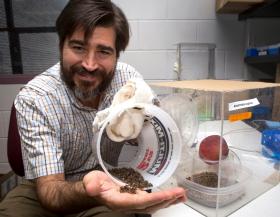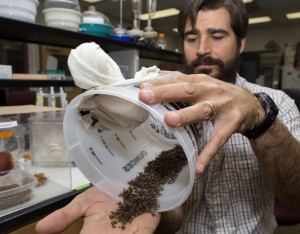Daniel Hahn, University of Florida – “Sexy” Fruit Flies
 Apparently, you can sterilize flies too well.
Apparently, you can sterilize flies too well.
In today’s Academic Minute, Daniel Hahn, assistant professor in the University of Florida’s department of entomology and nematology, discusses a new and improved fly sterilization methodology.
Dr. Daniel Hahn is an assistant professor in the University of Florida’s department of entomology and nematology. He is broadly interested in the proximate physiological and biochemical mechanisms that underlie the diversification of life histories. In addition, he researches the metabolic basis of life history evolution and how insects interact with their environment and the physiological mechanisms of environmental stress resistance. He earned a Ph.D. in insect science at the University of Arizona in 2003.
Daniel Hahn – “Sexy” Fruit Flies
Given even the tiniest foothold, invasive insect pests, such as the Mediterranean fruit fly, can cost agriculture billions of dollars. The sterile insect technique has been used for decades as an environmentally friendly alternative to chemical pesticides. This technique involves releasing a large number of sterilized male insects over seaports and agricultural areas to mate with unsuspecting females. As a result, these wild females cannot reproduce, which reduces pest populations and saves crops.
The major problem with the sterile insect technique is that the sterilization process itself is tough on the insects. Sterilized males are less healthy, less attractive, and overall less sexually competitive than their unsterilized male counterparts. If we could produce sterilized males that are better able to attract the attention of wild females, sterile insect programs would be both more effective and deliver a bigger bang for the buck.
Our lab has shown that exposing young flies and moths to a low-oxygen environment boosts production of protective antioxidants and reduces damage from sterilization. These antioxidant-enhanced male flies lived longer and were “sexier” to females — even at an older age. While this “low-oxygen effect” has been known for some time, our lab was the first to show that antioxidants produced by the insects themselves were important.
Some active sterile insect programs already use low-oxygen treatments that boost antioxidants, but we hope that by demonstrating the physiology behind making sterile male fruit flies more attractive will encourage others to follow suit, making the process even more effective and saving money.



